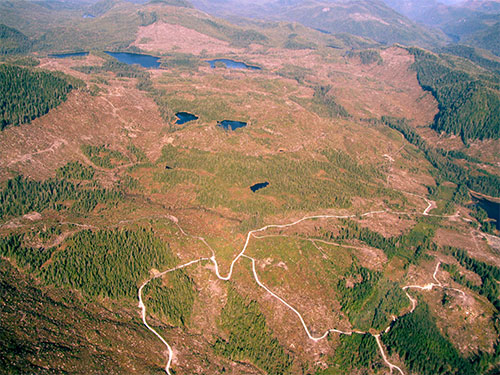
Timber Sale On Hold, Road Link Allowed to ProceedBy MARY KAUFFMAN
March 15, 2016
The proposed Saddle Lakes Timber Sale project is located in the middle of Revillagigedo Island, east of the city of Ketchikan, on a peninsula between George and Carroll Inlets. The project would harvest approximately 30- 47 million board feet (MMBF) of timber on about 2,207 acres using cable, shovel, and helicopter logging systems; and would construct up to 16 miles of NFS system and temporary road.
An aerial October 2015 photo of the Alaska Mental Health Trust’s nearly 4,000 acre clear-cut that is adjacent to the Saddle Lakes project area
“We’re glad to see this project put on hold,” said Dune Lankard, senior Alaska representative for the Center for Biological Diversity. “This kind of destructive logging comes at a steep price for wildlife including wild salmon, wolves and goshawks that call these incredible forests home. Revilla Island is a treasure of Southeast Alaska and deserves better than continued massive clearcutting.” Although the timber sale is delayed, the Forest Service is authorizing a right-of-way to the State of Alaska to build the long-planned six-mile Shelter Cove Road. The road would be a low-volume road, rock and gravel road between two existing low-standard roads that would extend from the end of Revilla Road at Harriet Hunt Lake all the way to the Shelter Cove on Carroll Inlet. The 1.1-mile road link is on Forest Service land. The proposed road project would provide vehicle access to Shelter Cove and would allow the public increased opportunities for recreation, subsistence hunting and gathering, tourism, and small scale economic development consistent with public land use plans and policies. The decision to put the sale on hold was in response to a formal objection by environmental groups. Although the groups support building the fish pass, the conservation groups oppose the right-of-way. In November 2015, environmental groups objected to the project’s final environmental impact statement and an accompanying draft project decision. The proposed decision was for 47 million board feet of logging and 37 miles of road construction and reconstruction. Organizations requesting further public comments on the Saddle Lake Timber Sale included Greenpeace, Greater Southeast Alaska Conservation Community (GSACC), Cascadia Wildlands, Center for Biological Diversity, and The Boat Company. “Much of Revilla Island, including the project area and its surroundings, has been very heavily logged,” said Larry Edwards, a Greenpeace Forest Campaigner based in southeastern Alaska. “The decision on our objection to the project recognizes that crucial cumulative impacts were not taken into account in the environmental impact statement. The transfer of a nearby 8,000 acres of Tongass old-growth forest to the Alaska Mental Health Trust, for logging, is in the works but was overlooked.” “Our organizations remain adamantly opposed to the 1.1 mile road link, or similar links across Revilla Island,” said Gabriel Scott of Cascadia Wildlands. “This link is part of a big scheme by the state and federal governments to interconnect isolated logging road systems throughout the island to a log export terminal in Ketchikan. This under-the-radar plan for massive exploitation of old-growth and second growth forest has not been squarely brought before the public.” The isolated logging road systems were created decades ago, when floating logging camps were used say the groups. The Alaska Mental Health Trust has clearcut nearly all of a 4,000 tract it owns that is adjacent to the Saddle Lakes project area, an indication, say the environmental groups, of the outcome of the 8,000 acre transfer to Alaska Mental Health Trust, if it occurs. Impacts of the transfer and the Saddle Lakes project would be additive. Logging on non-federal lands, such as by the Alaska Mental Health Trust, is done under the Alaska Forest Resources and Practices Act. FRPA is much weaker than the federal law that governs logging on the Tongass. Under FRPA, there is no limit to the size of clearcuts, and there are no enforceable provisions to protect wildlife habitat. INFRASTRUCTURE NEEDS MAPS
Map Developed by Alaska Mental Health Trust Land Office
Representations of fact and opinions in comments posted below are solely those of the individual posters and do not represent the opinions of Sitnews.
|
||

